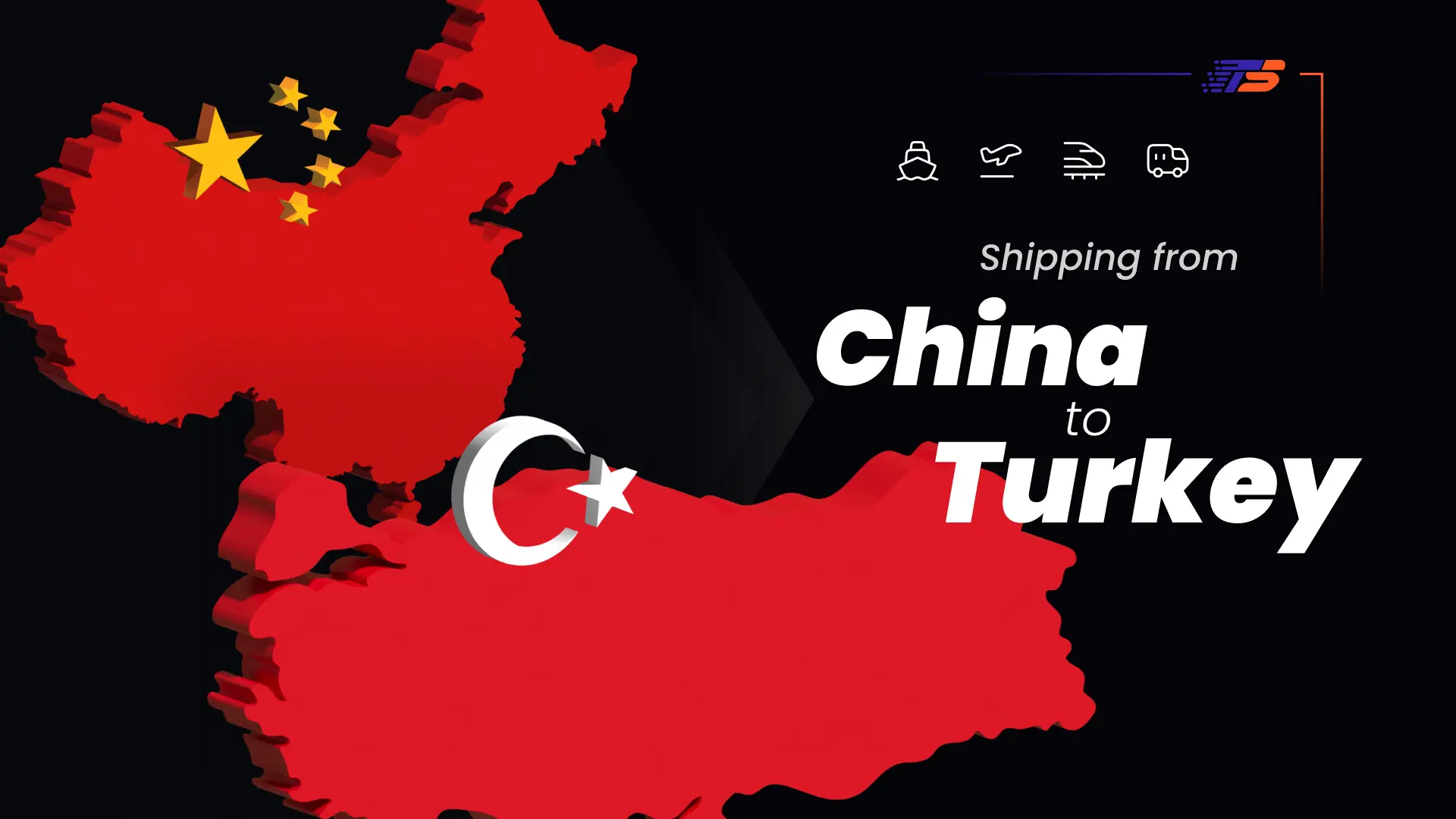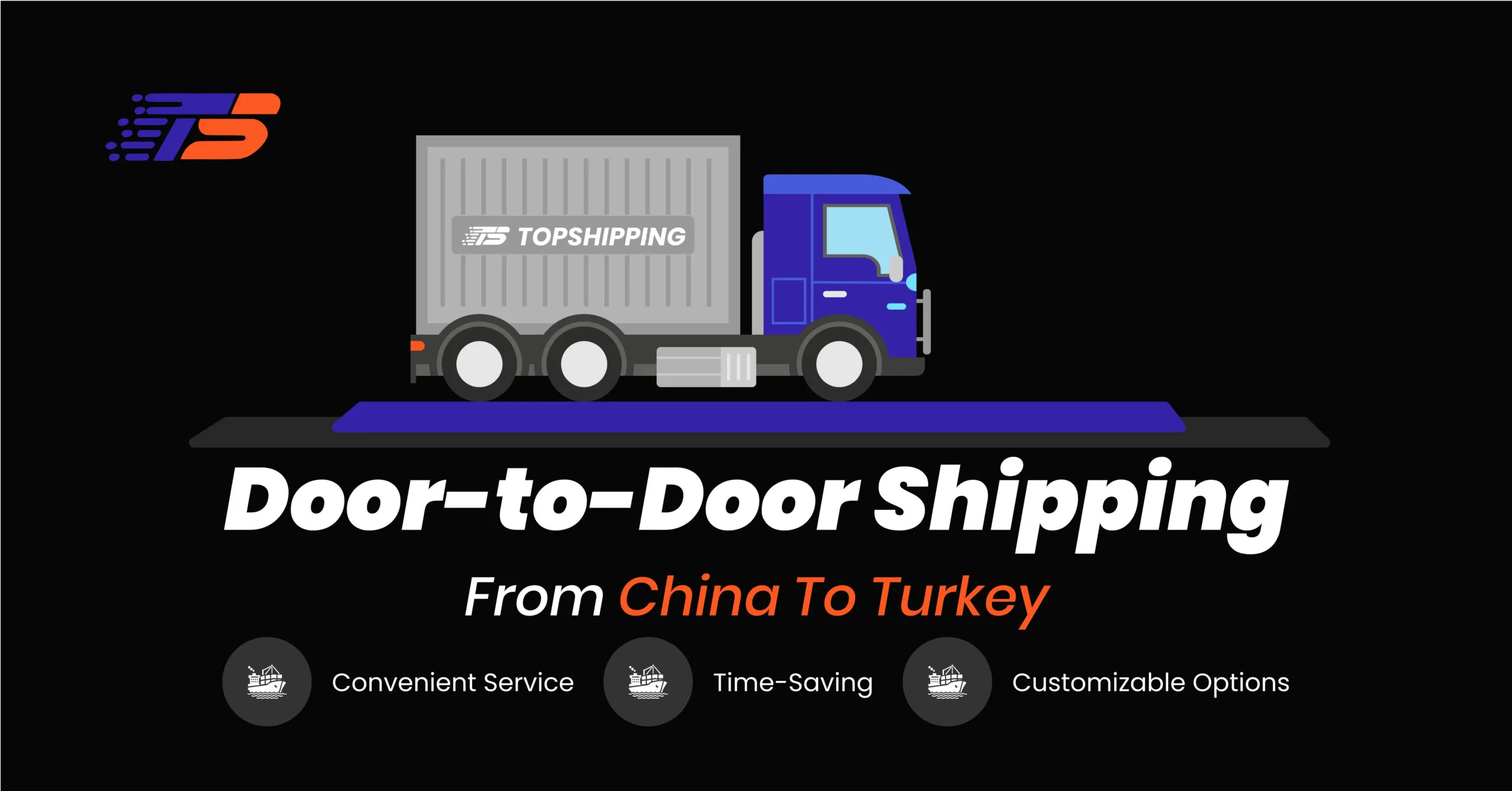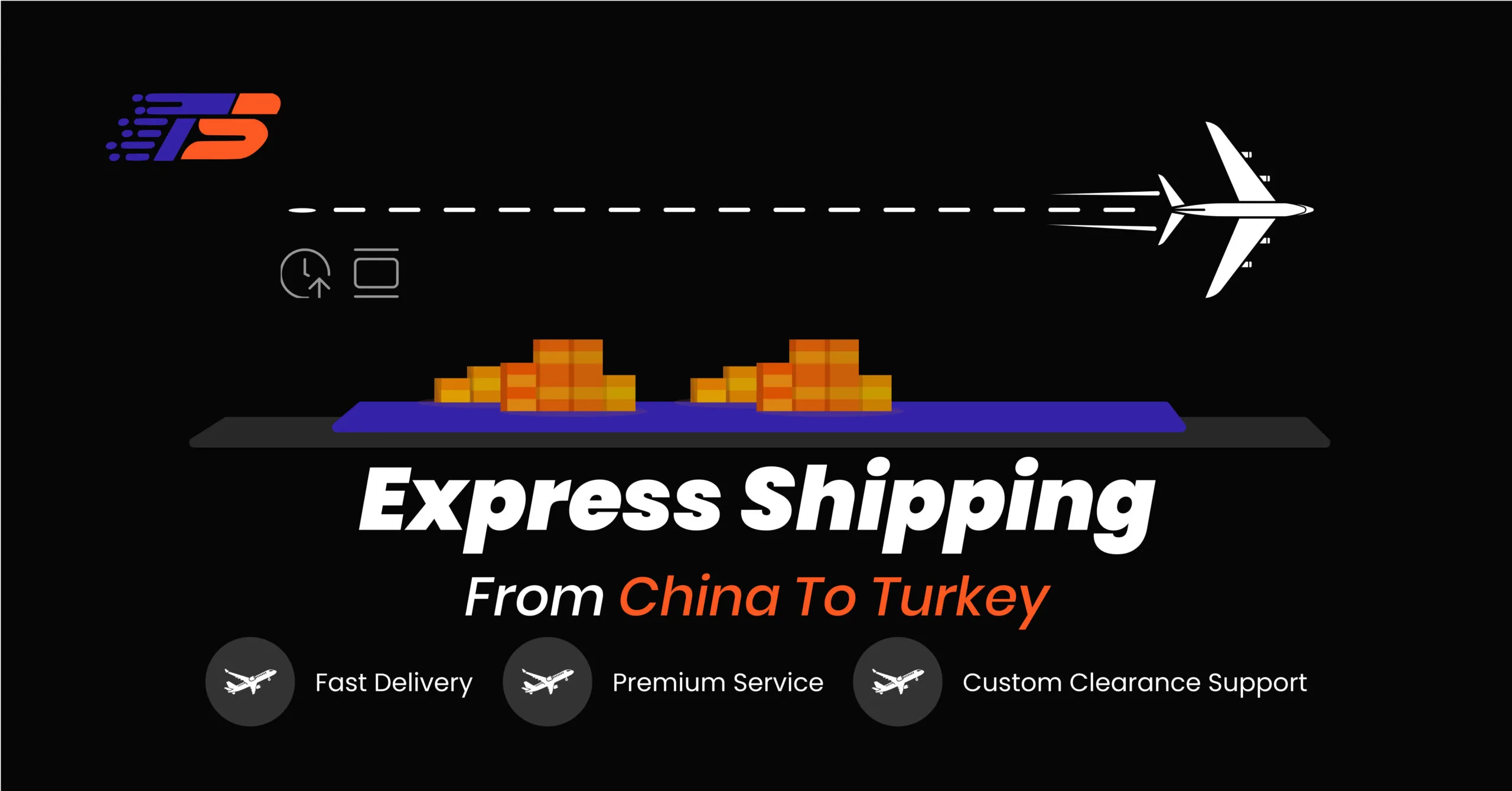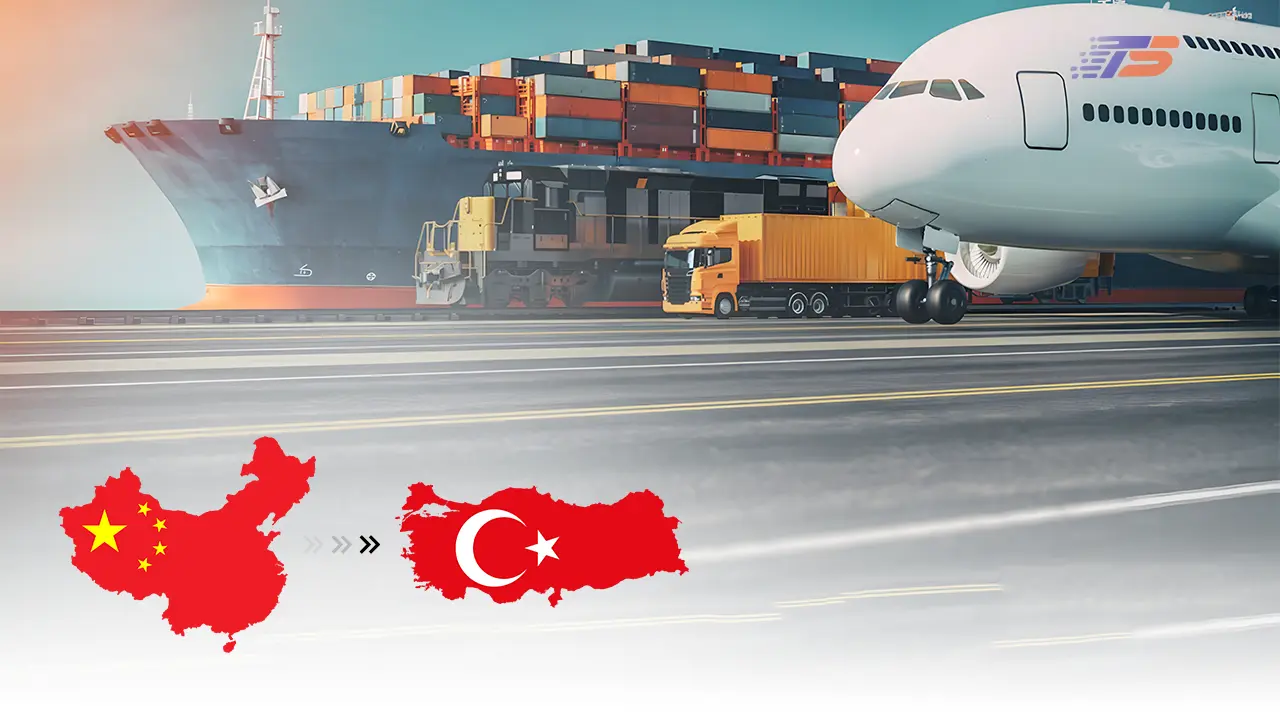Have you ever wondered how maritime shipping from China to Turkey drives economic growth?
In 2024, trade between the two countries reached $44.9 billion, boosting markets, creating jobs, and strengthening economic ties.
China mainly exports machinery, electronics, vehicles, steel, and plastics, while Turkey exports agricultural products, minerals, textiles, and traditional carpets.
Understanding the available shipping routes and choosing the right shipping methods whether sea, air, rail, or express courier is key to optimizing delivery speed, reducing costs, and ensuring goods arrive safely and on schedule.
By considering transit times, port options, and transportation costs, businesses can make informed decisions that streamline trade operations.
This comprehensive overview of trade logistics between China and Turkey helps importers and exporters plan efficiently, minimize delays, and take full advantage of the growing economic exchange between the two nations.
August 2025 Shipping Update: China → Turkey
Here’s the latest average market rates and transit times for shipments from China to Turkey (August 2025):
Costs
- Air Freight (1,000 kg+): ~$4.50 per kg
- Sea Freight (20′ container): $1,550
- Sea Freight (40′ container): $2,800
- Rail Freight (40′ container): ~$6,500
Delivery Times
| Mode | Route | Cost | Transit Time |
|---|---|---|---|
| Air Freight | China → Turkey | ~$4.50/kg (1,000 kg+) | 4–7 days |
| Sea Freight (20′) | China → Turkey | $1,550 | 20–30 days |
| Sea Freight (40′) | China → Turkey | $2,800 | 20–30 days |
| Rail Freight (40′) | China → Turkey | ~$6,500 | 18–25 days |

Shipping Options from China to Turkey
When shipping goods from China to Turkey, the main factors affecting cost and speed are the shipping method , cargo type, and urgency.
| Shipping Mode | Transit Time | Best For |
|---|---|---|
| Express Courier (DHL/UPS/FedEx) | 3–7 days | Urgent deliveries, lightweight packages, samples, high-value goods |
| Air Freight | 5–10 days | Medium-sized shipments, seasonal stock, urgent B2B deliveries |
| Rail Freight | 12–18 days | Medium-to-large shipments needing faster delivery than sea freight, high-value but non-urgent cargo |
| Sea Freight (FCL/LCL) | 20–45 days | Bulk cargo, large volumes, flexible delivery schedules, cost-sensitive shipments |
Container Types for Ocean Freight from China to Turkey
Selecting the right container for shipments from China to Turkey can save time and money.
- Standard Containers: Best for general cargo like textiles, electronics, and machinery.
- Refrigerated Containers: Keep perishable or sensitive items, such as food and chemicals, at the proper temperature.
- High Cube Containers: Provide extra space for large or bulky shipments without significantly higher costs.
Choosing wisely helps businesses ship efficiently, control expenses, and meet Turkey’s growing import demand.
Here’s a quick guide to container sizes and their ideal cargo.
| Container Type | Internal Dimensions (L × W × H) | Max Volume (CBM) | Best Use Case |
|---|---|---|---|
| 20′ Standard (TEU) | 5.90 m × 2.35 m × 2.39 m | 33–37 | Smaller shipments, heavy cargo, machinery, metals, tiles |
| 40′ Standard (FEU) | 12.03 m × 2.35 m × 2.39 m | 67–76 | Large-volume shipments without extra height, electronics, packaged goods |
| 40′ High Cube (HC) | 12.03 m × 2.35 m × 2.69 m | 76–86 | Light, bulky items, furniture, textiles, packaging foam |
| LCL (Less than Container Load) | Shared container space | 1–25 | Cost-effective for SMEs, irregular shipments, samples, small shipments |
| Reefer Container (40′ HC) | 11.58 m × 2.29 m × 2.55 m | 67.7 | Perishable goods, pharmaceuticals, food products |
| Open Top Container (40′ HC) | 12.03 m × 2.35 m × 2.67 m | 75.55 | Oversized cargo, heavy machinery, construction materials |
| Flat Rack Container (40′ HC) | 12.03 m × 2.35 m × 2.39 m | 53–60 | Extremely heavy or irregular-shaped cargo, vehicles, industrial equipment |

Efficient Door-to-Door Delivery to Turkey
Ensuring smooth Door-to-Door shipping from China to Turkey is key to a reliable supply chain. Whether it’s samples, high-value parcels, or full containers, timely delivery with minimal handling keeps your operations running. Accurate tracking, proper documentation, and customs support prevent delays at Turkish ports. Selecting the right method Express, Air, or Sea ets importers optimize speed, cost, and reliability.
Door-to-Door Shipping Process (China → Turkey)
- Collection: The freight forwarder picks up the goods directly from the supplier’s warehouse in China.
- Export Preparation: Shipments are moved to the nearest port, airport, or rail terminal and all export paperwork is completed.
- Transit: Goods travel to Turkey by sea, air, or rail depending on the chosen shipping method.
- Customs Clearance: Shipments are inspected and cleared at Turkish ports or airports.
- Delivery to Destination: The cargo is transported to the buyer’s facility or warehouse, completing the door-to-door service efficiently.
DDP Shipping from China to Turkey
Delivered Duty Paid (DDP) ensures the seller manages all aspects of shipping, including transportation, insurance, and customs clearance, until the goods reach your facility in Turkey.
Once the shipment is dispatched, the buyer has no further responsibilities.
Goods are prepared and cleared for export in China, either collected from your factory or our warehouse.
In Turkey, our local partner handles all import procedures, eliminating the need for VAT or EORI registration for the buyer.
DDP offers a reliable, hassle-free solution, ideal for businesses of any size importing from China to Turkey.
Amazon FBA Shipping Turkey
We take care of shipping your products directly to Amazon fulfillment centers in Istanbul, Ankara, and Izmir, fully packaged, labeled, and FBA-ready.
With complete end-to-end support, timely delivery, and full compliance with Turkish regulations, you can concentrate on growing your brand, boosting sales, and reaching Turkish customers with ease.

Express Shipping from China to Turkey
For urgent shipments, express shipping provides the fastest and most reliable way to move goods from China to Turkey. Ideal for high-value parcels, samples, or time-sensitive products, this service ensures your items reach their destination within a few days. With full tracking, customs support, and minimal handling, businesses can maintain supply chain efficiency while meeting tight deadlines. Express shipping helps you deliver quickly, reduce delays, and keep operations running smoothly.
Advantages of Express Shipping
- Speed: Delivers goods in the shortest possible time, ideal for urgent or time-sensitive shipments.
- Reliability: High level of service with guaranteed transit times and minimal delays.
- Tracking & Visibility: Real-time tracking lets you monitor your shipment at every stage.
- Reduced Handling: Fewer touchpoints reduce the risk of damage or loss.
- Convenience: Door-to-door service simplifies logistics and saves time for businesses.
- Flexibility: Suitable for parcels, samples, high-value goods, or small bulk shipments.
By selecting our services for express shipping from China to Turkey, you can trust that every step meets the highest standards. This guarantees smooth delivery, minimizes risks, and ensures your shipments arrive quickly and efficiently, keeping your supply chain reliable and hassle-free.
Express Shipping Suited For
- Urgent parcels and time-sensitive products
- High-value or fragile items
- Product samples for testing or market launch
- Small to medium-sized shipments requiring fast delivery
- Businesses needing reliable door-to-door service with minimal handling Shipping from China to Portugal Transit Time
Shipping from China to Turkey Transit Time
When it comes to shipping goods from China to Turkey, the key challenge for importers is finding the right balance between speed, cost, and reliability.
Each method sea freight, air freight, rail, or express offers unique advantages depending on the type of cargo, shipment size, and urgency.
To make your decision easier, we’ve prepared a clear comparison table showing the estimated transit times for each shipping method.
This will help you choose the option that best fits your business needs.
| Shipping Method | Transit Time | Customs & Handling | Total Estimated Delivery Time | Best Suited For |
|---|---|---|---|---|
| Express Courier (DHL/FedEx/UPS) | 2–4 days | 1–2 days | 3–6 days | Urgent parcels, samples, eCommerce shipments |
| Air Freight (Standard) | 3–7 days | 2–3 days | 5–10 days | Medium-weight shipments, time-sensitive B2B cargo |
| Sea Freight (LCL) | 21–26 days | 3–5 days | 24–31 days | Small to medium shipments, cost-effective option |
| Sea Freight (FCL) – 20ft | 18–22 days | 3–5 days | 21–27 days | Large shipments, full container loads |
| Sea Freight (FCL) – 40ft | 19–23 days | 3–5 days | 22–28 days | Large-volume cargo, cost-efficient |
| Rail Freight (LCL/FCL) | 12–18 days | 2–3 days | 14–21 days | Eco-friendly, faster alternative to sea freight |
Transit Time Factors and Solutions
Several factors can affect how long shipments take from China to Turkey, including:
- Shipping Method: Sea, air, rail, and express services vary in speed.
- Customs Clearance: Delays can occur if documentation is incomplete or shipments are inspected.
- Port Congestion: Busy ports can extend transit times.
- Seasonal Demand: Peak periods like holidays or sales seasons may slow shipping.
Holiday & Peak Season Considerations for Shipping from China to Turkey
Shipping from China to Turkey can face delays during major holidays and peak seasons, such as Chinese New Year, Ramadan, or global sales events like Black Friday. During these times, ports and logistics companies usually handle a much higher volume of cargo, which can lead to longer transit times and sometimes higher shipping costs.
Shipping Costs & Transparent Pricing
Shipping from China to Turkey doesn’t have to be complicated.
At TopShipping, we offer all-inclusive pricing that covers every stage from freight and customs duties to port fees, taxes, and final delivery. You’ll always know exactly what you’re paying for, with no hidden charges.
Whether it’s full container loads, partial shipments, or small parcels for e-commerce, our clear pricing model helps importers stay on budget and ensures smooth, on-time deliveries across Turkey.
| Service Type | Cost Range | Best For | Estimated Transit Time (Door-to-Door) |
|---|---|---|---|
| Express Courier (DHL/UPS/FedEx) | ~$8–15 per kg | Urgent parcels, samples, e-commerce orders | ~3–7 days |
| Air Freight (Standard) | ~$4.50–8.00 per kg | Medium-weight, time-sensitive shipments | ~4–7 days |
| Sea Freight (LCL) | ~$50–120 per CBM | Small/medium non-containerized cargo | ~25–40 days |
| Sea Freight (FCL) – 20 ft | ~$2,550–4,350 per container | Bulk loads, full container use | ~20–35 days |
| Sea Freight (FCL) – 40 ft | ~$4,050–5,850 per container | High-volume cargo | ~20–35 days |
| Rail Freight (40 ft) | ~$2,000–3,500 per container | Faster than sea, eco-friendlier | ~14–20 days |
Factors Affecting Shipping Costs from China to Turkey
Shipping costs between China and Turkey can vary significantly depending on several key factors:
- Mode of Transport :Express courier, air freight, sea freight, and rail all come with different pricing structures. sea freight is generally cheapest for bulk, while express is costlier but fastest.
- Shipment Size & Weight: Pricing is often calculated by either actual weight (kg) or volume (CBM). Larger shipments usually get lower unit costs, especially with full containers (FCL).
- Route & Carrier Choice: Rates differ depending on shipping lines, airlines, or rail operators. Direct routes are faster but may cost more, while transshipment adds time and handling fees.
- Season & Market Demand: Costs rise during peak seasons (e.g., pre-holiday periods, Chinese New Year, Black Friday imports) due to limited space and higher demand.
- Customs Duties & Taxes: Import duties, VAT, and Turkish customs clearance fees directly affect the total cost. Proper documentation helps avoid penalties or delays.
- Fuel Prices & Surcharges: Fluctuations in global fuel prices (BAF, CAF surcharges) impact both sea and air freight rates.
- Special Cargo Requirements: Temperature-sensitive goods (reefer), oversized cargo, or dangerous goods require special handling, increasing costs.

Common Import Duty Examples for Turkey
Turkey applies import duties based on the product’s HS code, with rates varying by category. In addition, an 18% VAT is usually charged on the total landed value, which includes the product cost, freight, insurance, and any customs tariffs. Some goods, such as luxury items or specific regulated products, may also face extra taxes. Clear documentation and accurate HS classification are essential to avoid unexpected delays or charges.
| Product Category | Customs Duty Rate | VAT Rate | Notes |
|---|---|---|---|
| Electronics | 0% – 5% | 18% | Includes mobile phones, laptops, and consumer electronics. |
| Clothing & Apparel | 10% – 12% | 18% | Encompasses garments, textiles, and fabrics. |
| Footwear | 10% – 15% | 18% | Covers all types of shoes and boots. |
| Toys | 0% – 5% | 18% | Pertains to children’s toys and games. |
| Machinery & Industrial Equipment | 1% – 5% | 18% | Includes industrial machinery and equipment. |
| Furniture | 0% – 5% | 18% | Encompasses home and office furniture. |
| Cosmetics & Personal Care | 5% – 8% | 18% | Covers skincare, haircare, and beauty products. |
| Sports Equipment | 3% – 6% | 18% | Includes fitness gear, bicycles, and sporting goods. |
| Books & Stationery | 0% | 18% | Pertains to printed books and office supplies. |
| Automotive Parts | 5% – 10% | 18% | Covers car parts, accessories, and engines. |
| Food & Beverages | 5% – 12% | 18% | Includes packaged foods, drinks, and snacks. |
| Medical Equipment | 0% – 2% | 18% | Encompasses hospital equipment and diagnostic tools. |
| Textiles & Fabrics | 8% – 12% | 18% | Covers raw textiles, yarns, and fabric rolls. |
Turkey Customs & Import Documentation Requirements
When importing goods from China to Turkey, it’s important to prepare the right customs documents to ensure smooth clearance and avoid delays.
These documents confirm product details, value, and compliance with Turkish regulations.
To make it simple, we’ve prepared a table listing the essential documents you will need, as well as those that are only required in specific cases.
| Document Type | Required For | Purpose / Notes |
|---|---|---|
| Commercial Invoice | All imports | Declares the value of goods for calculating Turkish customs duties and VAT. Must be accurate to avoid fines or clearance delays. |
| Packing List | All shipments | Details cargo content for inspection and verification. Helps Turkish Customs classify goods efficiently. |
| Bill of Lading / Air Waybill (AWB) | Sea, air, rail freight | Proof of shipment and contract of carriage between shipper and carrier. |
| Certificate of Origin | Goods eligible for preferential duty rates | Confirms origin to claim reduced customs rates under trade agreements (e.g., Turkey-China FTA). |
| Import Declaration (Turkish Customs) | All commercial cargo | Mandatory electronic filing for clearance through Turkish Customs. Speeds up processing and ensures compliance. |
| Compliance Certificates / Licenses | Electronics, machinery, medical devices, chemicals, food | Ensures compliance with Turkish standards, safety regulations, and industry-specific rules. |
| Tax ID / E-Import Number | All commercial imports | Required registration for importers to process customs clearance and VAT reporting in Turkey. |
| Insurance Certificate | All shipments | Proof of coverage for loss or damage during transit; often required by freight forwarders or buyers. |
| Proforma Invoice | Samples, quotations, pre-shipment approval | Used for preliminary customs assessment, cost estimates, or import approvals. |
Customs Clearance Tips for Shipping to Turkey
- Prepare Accurate Documentation :Ensure invoices, packing lists, certificates of origin, and compliance documents are correct to avoid delays or fines.
- Classify Goods Properly : Use the correct HS codes to determine customs duties and VAT accurately. Misclassification can result in penalties.
- Use a Reliable Customs Broker : Local experts can navigate Turkish regulations efficiently and handle electronic filings.
- Declare All Costs : Include product value, freight, insurance, and additional charges in the customs declaration for smooth clearance.
- Check Special Regulations : Some products like electronics, medical devices, or chemicals require additional certificates or licenses.
- Track Shipments Closely : Monitor your cargo status to anticipate potential delays and act quickly if issues arise.
- Plan for Peak Seasons : Customs processing may slow down during holidays or peak import periods; schedule shipments in advance.
Customs Clearance Methods & Incoterms for Shipping China to Turkey
| Incoterm | Seller’s Responsibility | Buyer’s Responsibility | Best For | Approx. Transit Time (China → Major Turkish Ports: Istanbul, Izmir, Mersin) | Estimated Cost Responsibility |
|---|---|---|---|---|---|
| DDP Incoterm (Delivered Duty Paid) | Full shipping, insurance, Turkish customs duties, VAT, and delivery to buyer’s warehouse or doorstep | Simply receive goods | First-time importers or those seeking hassle-free door-to-door delivery | 25–40 days (sea) / 5–12 days (air) | Seller covers freight, insurance, customs duties, VAT, port handling, and final delivery |
| DAP incoterm (Delivered At Place) | Delivery to agreed Turkish port (e.g., Istanbul, Izmir, Mersin) | Customs clearance, duties, VAT, and inland transport | Experienced importers managing customs locally | 20–35 days (sea) / 5–10 days (air) | Buyer pays import duties, VAT, and inland transport costs |
| CIF incoterm(Cost, Insurance, Freight) | Shipping & insurance to Turkish port | Customs clearance, duties, VAT, and inland delivery | Port-to-port shipments needing insurance coverage | 20–35 days (sea) / 5–10 days (air) | Seller pays freight & insurance; buyer handles customs duties, VAT, and inland transport |
| FOB Incoterm(Free On Board) | Goods loaded onto vessel at Chinese port | International freight, customs, VAT, and delivery | Importers managing their own shipping and logistics | Depends on chosen freight mode | Buyer pays all costs from port of loading onwards (freight, insurance, customs, VAT, delivery) |
Prohibited and Restricted Items
Shipping goods to Turkey requires a clear understanding of local import regulations. Some products cannot be imported under any circumstances, while others need specific permits or certifications. Being aware of these requirements prevents unexpected delays, fines, or confiscation at customs.
To simplify planning, we’ve created a practical table showing prohibited and restricted items for Turkey, helping you ensure smooth and compliant shipments.
| Category | Prohibited Items | Restricted / Conditional Items |
|---|---|---|
| Dangerous Goods & Weapons | Firearms, ammunition, explosives, fireworks, pepper spray | Knives over certain length, chemicals requiring permits, flammable liquids with restrictions |
| Endangered Species & Cultural Artifacts | Ivory, exotic animal skins, endangered wildlife | Antiques, cultural artifacts – require import permits from Turkish authorities |
| Food, Alcohol & Agricultural Products | Fresh meat or dairy without certification, unlicensed alcohol | Meat, dairy, fish, honey, live plants – must have health or phytosanitary certificates |
| Cosmetics & Personal Care | Products with banned or unsafe ingredients | Must comply with Turkish regulations; CE marking or local approval if required |
| Medical Devices & Pharmaceuticals | Unregistered drugs, unapproved medical devices | Registered medical devices; prescription medicines require official authorization |
| Currency | Counterfeit or illegal funds | Cash above 50,000 TRY must be declared to Turkish Customs |
| Electronics & Batteries | Non-compliant electronics, unsafe batteries | Lithium batteries, drones, or devices with radio transmitters must comply with Turkish safety and transport rules |
Key Ports in China and Turkey for Shipping
Major Origin Ports & Cities in China for Turkey Shipments
Shanghai (SHACN): China’s busiest container port, ideal for large-volume shipments to northern and western Turkish ports.
- Shenzhen/Yantian (SZXCN): Hub for electronics, consumer goods, and fashion, offering reliable sea and air freight options to Turkey.
- Guangzhou (CANCN): Major manufacturing center, providing flexible sea-air routes for urgent deliveries.
- Ningbo (NGBCN): Cost-effective alternative for both LCL (Less than Container Load) and FCL (Full Container Load) shipments.
- Qingdao (TAOCN): Northern port suitable for bulk cargo, machinery, and industrial goods to Turkey.
Major Destination Ports in Turkey
- Istanbul / Ambarli (TRIST): Key northern port serving industrial and consumer markets efficiently.
- Izmir / Alsancak (TRIZM): Central Turkey’s main hub for machinery, textiles, and consumer goods.
- Mersin (TRMES): Southern gateway, ideal for bulk shipments, food products, and industrial cargo.
- Trabzon (TRTRB): Northern Black Sea port, supporting specialized cargo and regional distribution.
- Gemlik (TRGEM): Strategic port for automotive and industrial imports.
Careful route planning, combined with experienced logistics partners, ensures your shipments from China to Turkey arrive safely, on schedule, and ready for distribution across the country.
Major Air Freight Hubs for China to Turkey Shipments
Key Airports in China:
- Shanghai Pudong International Airport (PVG): China’s largest air cargo hub, ideal for electronics, textiles, and general merchandise with frequent flights to Istanbul and other Turkish cities.
- Guangzhou Baiyun International Airport (CAN): Southern China gateway for automotive parts, consumer goods, and industrial machinery.
- Shenzhen Bao’an International Airport (SZX): Main hub for high-tech electronics, fashion, and urgent shipments, offering fast customs processing.
- Beijing Capital International Airport (PEK): Northern hub for samples, medical equipment, and time-sensitive cargo.
- Ningbo Lishe International Airport (NGB): Growing hub for industrial and consumer goods, offering cost-efficient air cargo options.
Major Airports in Turkey:
- Istanbul Airport (IST): Turkey’s main air cargo hub, efficiently serving both European and Asian trade lanes; perfect for high-value electronics, textiles, and consumer goods.
- Sabiha Gökçen International Airport (SAW): Secondary Istanbul hub, ideal for eCommerce shipments and smaller parcels.
- Ankara Esenboğa Airport (ESB): Central Turkey gateway, supporting machinery, industrial equipment, and high-priority cargo.
- Izmir Adnan Menderes Airport (ADB): Western Turkey hub for textiles, consumer goods, and perishable shipments.
- Bursa Yenişehir Airport (YEI): Northern Marmara region, specialized for automotive and industrial cargo.
Using the right combination of Chinese origin airports and Turkish destination hubs ensures fast, reliable, and cost-efficient air shipments, keeping your supply chain smooth and timely.
Smart Shipping Routes & Airport Selection for Turkey
Choosing the right route and airport is key to fast, cost-effective shipments from China to Turkey. Major Chinese airports like Shanghai PVG, Guangzhou CAN, and Shenzhen SZX handle high volumes of electronics, textiles, and industrial goods with reliable flight schedules.
On the Turkish side, Istanbul Airport (IST) serves as the primary hub for most cargo, while Sabiha Gökçen (SAW), Ankara (ESB), and Izmir (ADB) provide strategic alternatives for regional deliveries. Selecting the optimal combination of origin and destination airports reduces transit times, minimizes handling, and ensures goods arrive safely and on schedule.
Shipping Platforms & Freight Partners for China to Turkey
DHL Express – Fast & Reliable
- Transit Time: Typically 3–5 business days from major Chinese cities (e.g., Shanghai, Shenzhen) to Istanbul or Ankara.
- Coverage: Direct delivery to major hubs like Istanbul, Ankara, Izmir, and Bursa.
- Best For: Urgent shipments, high-value items, or temperature-sensitive products requiring priority handling.
- TopShipping Insight: Ideal when speed and reliability are critical, ensuring your shipments arrive on time without surprises.
FedEx Express – Efficient Customs & Wide Reach
- Transit Time: Approximately 4–6 business days from China to Turkey, depending on the origin and destination cities.
- Coverage: Suitable for e-commerce, business samples, and essential documents to both metropolitan and regional destinations.
- Best For: Small to medium-sized enterprises seeking dependable yet cost-effective express delivery.
- TopShipping Insight: A smart choice for regular shipments that need consistent timing and professional customs support.
UPS Express – Bulk & B2B Friendly
- Transit Time: Approximately 4–6 business days from China to Turkey, supported by advanced ground logistics across Turkey.
- Coverage: Handles larger consignments, Amazon FBA shipments, and B2B deliveries efficiently.
- Best For: Exporters with frequent, high-volume shipments who require predictable schedules.
- TopShipping Insight: Excellent for businesses managing tight deadlines and heavy shipments with minimal hassle.
International Freight Forwarder from China to Turkey
Move your shipments from China to Turkey seamlessly with TopShipping, your reliable international freight partner. From collection at your supplier’s warehouse in China to delivery at homes or warehouses in Istanbul, Ankara, or Izmir, we ensure safe, timely, and stress-free transportation every step of the way.
How to Select the Right Freight Forwarder for Turkey?
Choosing the right freight partner is crucial for smooth shipments from China to Turkey.
Look for:
- Proven Track Record: Experience with China–Turkey routes ensures reliability.
- Strong Local Network: Trusted partners in both countries for seamless logistics.
- Full-Service Solutions: Warehousing, consolidation, and last-mile delivery options.
- Customs Knowledge: Expertise in Turkish import regulations to avoid delays.
- Transparent Pricing: Clear, all-inclusive fees with no hidden costs.
- Secure Cargo Handling: Proper care for fragile, bulky, or high-value items.
- Responsive Support: Quick assistance and real-time updates on shipments.
- Shipment Visibility: Advanced tracking from origin to final delivery.
Partnering with a forwarder meeting these criteria ensures timely, safe, and hassle-free shipping to Turkey.
Shipping Made Simple: From China to Turkey in Easy Steps
1. Plan & Check Regulations
- Identify your goods’ type, weight, volume, value, and sensitivity.
- Review Turkish import rules, required certificates, and customs duties.
- Estimate costs including freight, insurance, and VAT to avoid surprises.
2. Decide on Incoterms
- Choose terms like FOB, CIF, DAP, or DDP.
- Confirm which party covers costs and risks at each stage.
3. Prepare Shipping Documents
- Commercial Invoice
- Packing List
- Bill of Lading (B/L) or Air Waybill (AWB)
- Certificate of Origin
- Any special permits for restricted goods (sanitary, CE, safety, etc.)
4. Pack & Label Professionally
- Use sturdy boxes or pallets with waterproofing.
- Include clear labels: shipper, recipient, order number, handling instructions.
- Add seals or tamper-proof options for extra security.
5. Select Shipping Method
- Sea Freight (LCL/FCL): Best for large or non-urgent cargo.
- Air Freight: Ideal for valuable or time-sensitive goods.
- Rail Freight: Balanced speed and cost for medium shipments.
- Express Courier (DHL, UPS, FedEx): Fast delivery, 3–6 days.
6. Coordinate with a Freight Forwarder
- Choose a provider experienced in China–Turkey routes.
- Consider add-ons like cargo insurance, consolidation, or door-to-door service.
7. Chinese Export Clearance
- Confirm export documents and payments with your supplier.
- Obtain approval from Chinese customs before shipment.
8. International Transport
- Load cargo at the chosen Chinese port or airport.
- Track shipments in real-time for progress updates.
9. Turkish Customs Clearance
- Submit documents to Turkish Customs.
- Pay applicable duties and VAT.
- Obtain release and prepare for inland delivery.
10. Final Delivery in Turkey
- Transport goods from port or airport to your warehouse or destination city (Istanbul, Izmir, Ankara, etc.).
- With DDP, the forwarder handles the complete delivery process.
11. Post-Delivery Check
- Inspect goods upon arrival for accuracy and condition.
- Keep all shipping documents for accounting, taxes, and compliance.
- Evaluate your freight forwarder to improve future shipments.
Final Review
Shipping from China to Turkey can feel overwhelming, but with careful planning, accurate documentation, and a skilled freight forwarder , the process is straightforward and efficient. Selecting the right Incoterms, transport method, and ensuring smooth Turkish customs clearance are essential to avoid delays and extra costs.
Following a structured approach helps importers stay in control, minimize risks, and guarantee timely delivery to Istanbul, Izmir, Ankara, or any destination in Turkey. Partnering with experienced logistics professionals ensures your shipments arrive safely, on schedule, and ready for the local market.
Preparation, transparency, and the right shipping partner are the keys to hassle-free trade between China and Turkey.
FAQs: Shipping to Turkey
Is Road Freight available from China to Turkey?
Yes. Road freight is one of the practical options for trade between China and Turkey.
Thanks to the Belt and Road Initiative, several overland shipping routes connect Chinese logistics hubs with Turkey.
How to ship from China to Turkey?
You can ship via sea, air, rail, or express couriers depending on speed and budget.
How long does it take to ship to Turkey?
Sea freight takes 25–35 days, air freight 3–7 days, and express couriers 2–5 days.
What does Turkey import from China?
Mainly machinery, electronics, textiles, plastics, vehicles, and steel.
Is it expensive to ship to Turkey?
Costs vary by method, but sea is cheapest, air is moderate, and express is most expensive.
How much would it cost to ship a package to Turkey?
Small parcels via courier start around $20–$40, while freight depends on size and weight.
What is the best agent to ship from China?
The best choice is to work with an experienced freight forwarder that has strong operations in both China and Turkey, ensuring smooth customs clearance and on-time delivery.
That’s exactly what TopShipping provides. With our local offices and trusted partners, we handle every step of the process—from pickup in China to final delivery in Turkey—making shipping efficient, transparent, and hassle-free.
What is the best way to ship to Turkey?
Sea freight for bulk goods, air freight for urgent cargo, and couriers for small parcels.
What is the trade route from China to Turkey?
Primarily through maritime routes via the Suez Canal


